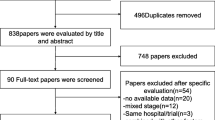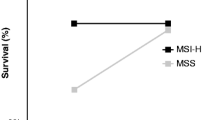Abstract
Purpose
Microsatellite instability in colorectal cancer (CRC) and its long-term outcomes remains poorly studied in Asians. We investigate the prognostic significance of microsatellite instability in an Asian population and assess its clinical impact in patients who undergo adjuvant chemotherapy.
Methods
Six hundred fifty-four consecutive CRC patients who underwent surgical resection between January 2010 and December 2012 were recruited. Survival was estimated using the Kaplan-Meier approach. Univariate Cox proportional hazard models were used to estimate the hazard ratios for variables associated with survival. A subgroup analyses was performed for stage III patients who underwent chemotherapy to evaluate the prognostic significance of microsatellite instability in this group.
Results
Five hundred ninety-one (90.4%) patients were microsatellite stable (MSS) while 63 (9.6%) were microsatellite instable (MSI). Three years recurrence-free survival (RFS) and disease-specific survival (DSS) were 83.7 versus 73.7% (p = 0.295) and 87.1 versus 91.2% (p = 0.307) in MSS and MSI tumors, respectively. Among stage III patients who received adjuvant therapy, MSI status was found to be an adverse prognostic factor for RFS (HR 2.74 (95% CI 1.43–5.26), p = 0.002). This remained significant on multivariate analysis (HR 2.38 (95% CI 1.15–4.93), p = 0.018). Adjuvant chemotherapy was associated with survival benefit for patients with MSS tumors (HR 0.35, 95% CI 0.17–0.69, p = 0.002) but not MSI tumors (HR 0.67, 95% CI 0.08–8.15, p = 0.750).
Conclusions
MSI status is not a prognostic indicator in the general CRC population but appears to be an adverse prognostic indicator for RFS in stage III CRC patients who received adjuvant chemotherapy.

Similar content being viewed by others
References
Weitz J, Koch M, Debus J, Hohler T, Galle PR, Buchler MW. Colorectal cancer. Lancet. 2005;365(9454):153–65. doi:10.1016/S0140-6736(05)17706-X.
Buecher B, Cacheux W, Rouleau E, Dieumegard B, Mitry E, Lievre A. Role of microsatellite instability in the management of colorectal cancers. Dig Liver Dis. 2013;45(6):441–9. doi:10.1016/j.dld.2012.10.006.
Duval A, Hamelin R. Mutations at coding repeat sequences in mismatch repair-deficient human cancers: toward a new concept of target genes for instability. Cancer Res. 2002;62(9):2447–54.
Popat S, Hubner R, Houlston RS. Systematic review of microsatellite instability and colorectal cancer prognosis. J Clin Oncol. 2005;23(3):609–18. doi:10.1200/JCO.2005.01.086.
Elsaleh H, Joseph D, Grieu F, Zeps N, Spry N, Iacopetta B. Association of tumour site and sex with survival benefit from adjuvant chemotherapy in colorectal cancer. Lancet. 2000;355(9217):1745–50. doi:10.1016/S0140-6736(00)02261-3.
Ribic CM, Sargent DJ, Moore MJ, Thibodeau SN, French AJ, Goldberg RM, et al. Tumor microsatellite-instability status as a predictor of benefit from fluorouracil-based adjuvant chemotherapy for colon cancer. N Engl J Med. 2003;349(3):247–57. doi:10.1056/NEJMoa022289.
Le H, Ziogas A, Lipkin SM, Zell JA. Effects of socioeconomic status and treatment disparities in colorectal cancer survival. Cancer Epidemiol Biomark Prev. 2008;17(8):1950–62. doi:10.1158/1055-9965.EPI-07-2774.
Le H, Ziogas A, Taylor TH, Lipkin SM, Zell JA. Survival of distinct Asian groups among colorectal cancer cases in California. Cancer. 2009;115(2):259–70. doi:10.1002/cncr.24034.
Jung SH, Kim SH, Kim JH. Prognostic impact of microsatellite instability in colorectal cancer presenting with mucinous, signet-ring, and poorly differentiated cells. Ann Coloproctol. 2016;32(2):58–65. doi:10.3393/ac.2016.32.2.58.
Shin US, Cho SS, Moon SM, Park SH, Jee SH, Jung EJ, et al. Is microsatellite instability really a good prognostic factor of colorectal cancer? Ann Coloproctol. 2014;30(1):28–34. doi:10.3393/ac.2014.30.1.28.
BD ESB, Compton CC, et al. AJCC Cancer Staging Manual. 7th ed; 2009.
Wacker C, Prkno A, Brunkhorst FM, Schlattmann P. Procalcitonin as a diagnostic marker for sepsis: a systematic review and meta-analysis. Lancet Infect Dis. 2013;13(5):426–35. doi:10.1016/S1473-3099(12)70323-7.
Chew MH, Koh PK, Tan M, Lim KH, Carol L, Tang CL. Mismatch repair deficiency screening via immunohistochemical staining in young Asians with colorectal cancers. World J Surg. 2013;37(10):2468–75. doi:10.1007/s00268-013-2134-2.
Des Guetz G, Schischmanoff O, Nicolas P, Perret GY, Morere JF, Uzzan B. Does microsatellite instability predict the efficacy of adjuvant chemotherapy in colorectal cancer? A systematic review with meta-analysis. Eur J Cancer. 2009;45(10):1890–6. doi:10.1016/j.ejca.2009.04.018.
Ooki A, Akagi K, Yatsuoka T, Asayama M, Hara H, Takahashi A, et al. Combined microsatellite instability and BRAF gene status as biomarkers for adjuvant chemotherapy in stage III colorectal cancer. J Surg Oncol. 2014;110(8):982–8. doi:10.1002/jso.23755.
Saridaki Z, Souglakos J, Georgoulias V. Prognostic and predictive significance of MSI in stages II/III colon cancer. World J Gastroenterol. 2014;20(22):6809–14. doi:10.3748/wjg.v20.i22.6809.
Tougeron D, Mouillet G, Trouilloud I, Lecomte T, Coriat R, Aparicio T, et al. Efficacy of adjuvant chemotherapy in colon cancer with microsatellite instability: a large multicenter AGEO study. J Natl Cancer Inst. 2016;108(7) doi:10.1093/jnci/djv438.
Yang L, Sun Y, Huang XE, Yu DS, Zhou JN, Zhou X, et al. Carcinoma microsatellite instability status as a predictor of benefit from fluorouracil-based adjuvant chemotherapy for stage II rectal cancer. Asian Pac J Cancer Prev. 2015;16(4):1545–51.
Webber EM, Kauffman TL, O’Connor E, Goddard KA. Systematic review of the predictive effect of MSI status in colorectal cancer patients undergoing 5FU-based chemotherapy. BMC Cancer. 2015;15:156. doi:10.1186/s12885-015-1093-4.
Arnold CN, Goel A, Boland CR. Role of hMLH1 promoter hypermethylation in drug resistance to 5-fluorouracil in colorectal cancer cell lines. Int J Cancer. 2003;106(1):66–73. doi:10.1002/ijc.11176.
Kim JH, Kang GH. Molecular and prognostic heterogeneity of microsatellite-unstable colorectal cancer. World J Gastroenterol. 2014;20(15):4230–43. doi:10.3748/wjg.v20.i15.4230.
Meyers M, Wagner MW, Hwang HS, Kinsella TJ, Boothman DA. Role of the hMLH1 DNA mismatch repair protein in fluoropyrimidine-mediated cell death and cell cycle responses. Cancer Res. 2001;61(13):5193–201.
Shia J. Immunohistochemistry versus microsatellite instability testing for screening colorectal cancer patients at risk for hereditary nonpolyposis colorectal cancer syndrome. Part I. The utility of immunohistochemistry. J Mol Diagn. 2008;10(4):293–300. doi:10.2353/jmoldx.2008.080031.
Author information
Authors and Affiliations
Corresponding author
Ethics declarations
Conflicts of Interest
The authors declare that they have no conflicts of interest.
Rights and permissions
About this article
Cite this article
Tan, W.J., Hamzah, J.L., Acharyya, S. et al. Evaluation of Long-Term Outcomes of Microsatellite Instability Status in an Asian Cohort of Sporadic Colorectal Cancers. J Gastrointest Canc 49, 311–318 (2018). https://doi.org/10.1007/s12029-017-9953-6
Published:
Issue Date:
DOI: https://doi.org/10.1007/s12029-017-9953-6




